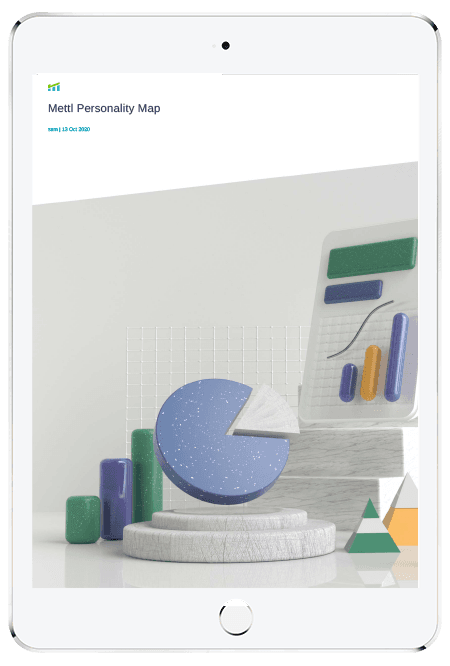Blockchain Developer Test for evaluating candidates' blockchain skills
This Blockchain Developer Assessment is designed to evaluate a candidate's proficiency in managing a blockchain system's design, architecture, and security. Designed by seasoned subject matter experts, this Blockchain Test guarantees the selection of the most suitable talent for your organization.
Inside This Blockchain Developer Test
The Blockchain Developer Assessment Test helps tech recruiters and hiring managers evaluate candidates' expertise in designing and developing Blockchain technologies. This assessment, meticulously crafted and validated by industry experts, adheres to the highest industry standards and streamlines hiring blockchain developers and engineers. It presents actionable insights into a candidate's practical knowledge and employability skills, ensuring job readiness and fitment. The flexibility of taking this test from anywhere, regardless of the time zone, adds ease and convenience to the assessment process.
The test covers essential competencies categorized into two sections - blockchain and solidity. The former section evaluates candidates' knowledge of blockchain fundamentals such as decentralized storage, hashing algorithms, protocols, smart contracts, cryptography, etc. It also covers concepts associated with popular platforms like Ethereum and Hyperledger Fabric. The solidity section includes questions on contracts, enums, inheritance, operators, and patterns to assess candidates' knowledge of solidity.
Overview
The increased demand for blockchain developers can be attributed to the maturation of major enterprise projects. These projects evolved from concept testing to pilot programs, eventually transitioning into full-scale production systems. Moreover, the increased adoption of blockchain technology across various industries (finance, healthcare, and supply chain, to name a few) intensifies this demand. More organizations are leveraging this technology to maximize security, transparency, and efficiency. Consequently, the need for skilled blockchain developers has surged.
However, finding the most suitable candidates can be challenging. Blockchain technology is complex, and compared to the demand, the pool of experienced developers is relatively limited. Moreover, the swiftly changing landscape of blockchain mandates developers to stay abreast of the latest advancements, emphasizing the need for candidates with experience and adaptability.
Companies can opt for initial screening evaluation through the Blockchain Developers Test in response to the difficulties in hiring blockchain developers.
This test helps identify potential applicants with the right skills and knowledge to excel and succeed in the blockchain industry. By evaluating the most crucial blockchain competencies, recruiters can conduct screening efficiently and effectively. Administering the test for blockchain developer hiring ensures that selected candidates are well-prepared for the roles employers envisioned for them, helping companies significantly save time and resources.
SKILL LIBRARY
Blockchain Developer Test Competency Framework
Get a detailed look inside the test
Blockchain Developer Test Competencies Under Scanner
Blockchain Developer Test
Competencies:
The blockchain section comprises questions addressing the following skill sets: Decentralized storage, hashing algorithms, hash function, protocols, DAO, distributed ledger, smart contracts, cryptography, delegated proof of stake (DPoS), proof of work (PoW), proof of stake (PoS), digital signatures, debugging and deployment, security, Bitcoin concepts, Coinbase transaction, Bitcoin forks and SegWit, decentralized applications (dApps), Ethereum, and Hyperledger Fabric.
Questions based on these solidity concepts have been covered within this section: Contracts, enums, patterns, inheritance, and operators.
Customize This Blockchain Developer Test
Flexible customization options to suit your needs
Choose easy, medium or hard questions from our skill libraries to assess candidates of different experience levels.
Add multiple skills in a single test to create an effective assessment. Assess multiple skills together.
Add, edit or bulk upload your own coding questions, MCQ, whiteboarding questions & more.
Get a tailored assessment created with the help of our subject matter experts to ensure effective screening.
The Mercer | Mettl Blockchain Developer Test Advantage
Frequently Asked Questions (FAQs)
The Blockchain Developers Skills Assessment is a helpful hiring tool to screen candidates for their knowledge and skills in blockchain development efficiently, ensuring the selection of the most qualified individuals. It helps reduce the risk of making a wrong hire by focusing on industry-standard competencies and assisting recruiters in identifying professionals with the job readiness to assume the responsibilities of blockchain development roles.
Yes, you can. The Blockchain Developers Test allows for customization to suit your organization's unique needs. Our team can work with you to tailor pre-employment assessments to include competencies and questions relevant to your specific projects, technology stack, or industry focus. This ensures that you are gauging candidates' suitability based on the skills and knowledge that are most critical for your business.
The Blockchain Developer Pre-Employment Assessment plays a pivotal role in assembling high-performing teams. Accurately identifying candidates with the right skills and knowledge helps you select the most suitable talent, improving the quality of your workforce. This, in turn, increases the likelihood of project success and innovation in the rapidly evolving blockchain landscape.
